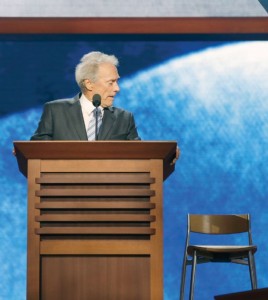By Tom Kozlowski
There was an empty seat on stage. The Tampa throng sweated to see what the gag was, why an empty seat was listlessly delivering a speech of silence at the Republican National Convention. When actor Clint Eastwood finally arrived, he growled and greyed at an empty seat that supported an even more invisible Barack Obama.
For 12 minutes, Eastwood was a disgruntled white man who wagged the finger of irrationality at a mirage: He was, above all, an accurate representation of the 2012 Republican Party.
There is no shame in calling party presidential conventions entertainment. They are like political advertisements: both Barack Obama and Mitt Romney need your bipartisan, multi-ethnic, flag-waving support if they care to be elected or reelected. But the content and logic behind convention ideology is still vulnerable to scrutiny, and sometimes, dare I mention, it’s even important.
These past two weeks should have clarified the reality of this election for every rational viewer — while the Democrats sounded with idealism and unity, the Republican Convention crucified fact with frenzied fiction.

When one sashays onto national television to support their candidate, they have two basic obligations. Primarily, support the actual candidate, and along the way, speak with logical argument. In Tampa, Fla. where the RNC was swamped by hurricane omens and angry fanatics, the convention speakers could barely uphold either.
Consider the RNC’s most anticipated orators. When Chris Christie appeared as the keynote speaker, he romped on an exclusive agenda: promote his own ambitions, divide and conquer, create the illusion that “us vs. them” is superior to a coalition of American thinkers pursuing prosperity. Only after 17 minutes did he mutter the name “Mitt Romney.” Christie was cold, and his vision was frightening.
When Paul Ryan emerged to reveal America’s panacea plans, he spoke with much divine patriotism about nothing at all. He was rife with generalities, he crooned that America could be great if we only imagined it so. But the GOP’s pioneer of price slashing offered nothing on issues from Medicare to military spending — former President Bill Clinton offered more specifics about the Republican budget than, lo and behold, the real Republican Party. Instead, Ryan and his ilk built a façade of success for audience appeal. If only they knew where to begin laying the foundations.
By midweek, the RNC had then lost its leader. Every conservative on the spectrum brandished convictions in the air but hesitated to fall in line behind their candidate, that guy “Mitt Romney.” Evidently, he is merely a pawn in their ploy to take back America. What was preferable instead was to front an army against Obama — invisible or not, culpable or not.
For Republicans, society was idyllic before Obama. Their convention rhetoric suggests that decade spanning dilemmas are only apparent now that a liberal executive has rained down upon America. And for Republicans, going back is now the antithetical way forward — the president must be overthrown with mobbing rhetoric.
Particularly abused was the chant “we built this,” an Obama quote ripped from context and slapped as the crux of convention ideology. The most trivial of complaints has bled onto the hands of the President. But is a misquote proper substitute for a valid opinion? Rational voters should shake their heads.
True, the Democrats are no flawless party either. They share their mistakes and their flamboyant figures. But their convention was so seamlessly hopeful, so chemically energetic, so diverse, so powerful and so open — Clinton presented their intentions, John Kerry punched out their criticisms. And largely, they utilized the facts, oh so elusive at the RNC.
At their climax, what differentiated the two conventions was their atmosphere. The DNC defused “us vs. them” while the RNC inflated it. The Democrats encouraged not political hatred, but equity, hard work, and some collective support behind their man, Barack Obama. Republicans were still occupied redefining “rape” and “responsibility.”
These conventions may be political advertisements, but that is no excuse to eschew reason and open-mindedness.
Clint Eastwood talked to an empty seat. He blamed entering the 2001 war in Afghanistan on Obama 2008, he desired no Harvard attorney for president despite that guy “Mitt Romney” matching those credentials and again, he would not stop talking to that invisible, seated scapegoat.
Republican rationality may have once sat there — at the RNC, it was just an empty seat.






